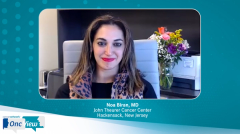
BCMA-Targeted CAR T-Cell Therapies in Multiple Myeloma
Experts on multiple myeloma discuss available BCMA-targeted CAR T-cell therapies and the KarMMa and CARTITUDE-1 clinical trials.
Episodes in this series

Transcript:
Noa Biran, MD: Certainly, we have a lot of ideas we’ve come up with together. We’re excited about a lot of the therapies we’re doing. I think it goes back to the evolution of treatment for myeloma. In the last decade, the way that we approach the disease has changed. I think we started with proteasome inhibitors, and then we got IMiDs [immunomodulatory drugs]. We got more potent versions of both of those classes of drugs. Then we started focusing more on monoclonal antibodies with various targets, CD38 as well as CS1. Now we are looking at a more novel target, BCMA [B-cell maturation antigen]. BCMA has taken a large role in many therapies for myeloma in terms of both cellular therapies, CAR [chimeric antigen receptors]T-cell therapies, and bispecific T-cell engagers. BCMA is present on almost all malignant plasma cells. It is present on some healthy plasma cells and also on some healthy hematopoietic cells, but it is a good target for myeloma because of its presence on almost all malignant plasma cells.
I think the development of CAR T cells brought this target to the forefront and has developed a novel way to treat our patients. More importantly, it has given patients who have relapsed an opportunity to have time off of therapy, which was never really an option in the past. Patients were getting chronic treatment with steroids and weekly infusions, injections. And now thanks to a cellular therapy—there are 2 that are now FDA approved—patients can go on to a durable remission without treatment.
We can talk a bit about the approval of the 2 BCMA-targeted CAR T cells. Ide-cel [idecabtagene vicleucel] and cilta-cel [ciltacabtagene autoleucel] are the 2 approved therapies. The KarMMa trial was the first trial to lead to registration and approval of the ide-cel target. This was a trial that enrolled patients who were exposed to triplets, so IMiDs, proteasome inhibitors, and monoclonal antibodies. Most of them were triple refractory, and these patients had durable remissions. They responded close to 80% of the time, and then remission lasted almost 20 months for patients who achieved a CR [complete response] at month 1. For others, the remission duration was shorter, but this was certainly much better than the standard of care for patients at this time.
The CARTITUDE-1 trial led to the approval of cilta-cel, which is another BCMA-targeted CAR T cell. Similar response rates were achieved and similar durability of response in patients who were triple refractory and had a median of 6 prior lines of therapy, so heavily pretreated patients.
Transcript edited for clarity.
Newsletter
Stay up to date on recent advances in the multidisciplinary approach to cancer.








































